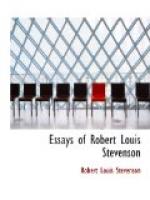attitude he did justice to himself and others, reposed
unshaken in his old beliefs, and recognised their limits
without anger or alarm. His last recorded remark,
on the last night of his life, was after he had been
arguing against Calvinism[41] with his minister and
was interrupted by an intolerable pang. “After
all,” he said, “of all the ’isms,
I know none so bad as rheumatism.” My own
last sight of him was some time before, when we dined
together at an inn; he had been on circuit, for he
stuck to his duties like a chief part of his existence;
and I remember it as the only occasion on which he
ever soiled his lips with slang—a thing
he loathed. We were both Roberts; and as we took
our places at table, he addressed me with a twinkle:
“We are just what you would call two bob."[42]
He offered me port, I remember, as the proper milk
of youth; spoke of “twenty-shilling notes”;
and throughout the meal was full of old-world pleasantry
and quaintness, like an ancient boy on a holiday.
But what I recall chiefly was his confession that
he had never read
Othello to an end.[43] Shakespeare
was his continual study. He loved nothing better
than to display his knowledge and memory by adducing
parallel passages from Shakespeare, passages where
the same word was employed, or the same idea differently
treated. But
Othello had beaten him.
“That noble gentleman and that noble lady—h’m—too
painful for me.” The same night the boardings
were covered with posters, “Burlesque of
Othello,”
and the contrast blazed up in my mind like a bonfire.
An unforgettable look it gave me into that kind man’s
soul. His acquaintance was indeed a liberal and
pious education.[44] All the humanities were taught
in that bare dining-room beside his gouty footstool.
He was a piece of good advice; he was himself the instance
that pointed and adorned his various talk. Nor
could a young man have found elsewhere a place so
set apart from envy, fear, discontent, or any of the
passions that debase; a life so honest and composed;
a soul like an ancient violin, so subdued to harmony,
responding to a touch in music—as in that
dining-room, with Mr. Hunter chatting at the eleventh
hour, under the shadow of eternity, fearless and gentle.
The second class of old people are not anecdotic;
they are rather hearers than talkers, listening to
the young with an amused and critical attention.
To have this sort of intercourse to perfection, I
think we must go to old ladies. Women are better
hearers than men, to begin with; they learn, I fear
in anguish, to bear with the tedious and infantile
vanity of the other sex; and we will take more from
a woman than even from the oldest man in the way of
biting comment. Biting comment is the chief part,
whether for profit or amusement, in this business.
The old lady that I have in my eye is a very caustic
speaker, her tongue, after years of practice, in absolute
command, whether for silence or attack. If she
chance to dislike you, you will be tempted to curse




